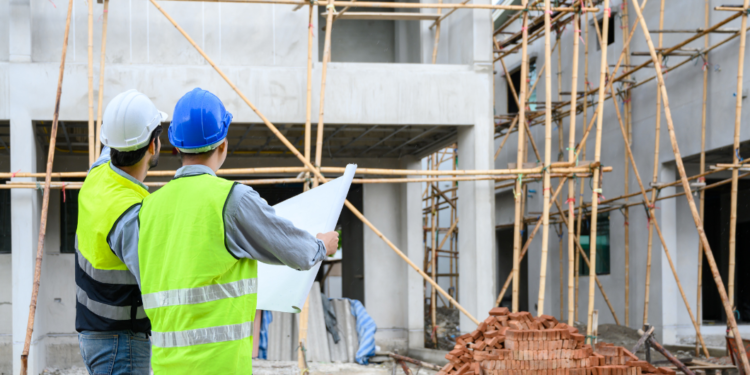Curious about home improvement? Explore What Does a General Contractor Do? for insights into their pivotal role in construction projects. In the vast world of construction, where projects span from modest residential renovations to towering skyscrapers, there exists a pivotal figure orchestrating the entire process: the general contractor. Often likened to the conductor of an orchestra, the general contractor is the mastermind behind the build, ensuring that every element of a construction project harmonizes seamlessly. But what exactly does a general contractor do? Let’s delve into the multifaceted role of these indispensable professionals.
Sneak Peek Ahead
What Is a General Contractor?
In the world of construction, a general contractor (or GC, as we like to call them) is the person or company that takes charge of a construction project. Usually, property owners hire GCs to make sure everything goes smoothly — that the job gets done safely, on time, and just like it was planned.
General contractors play a key role in all sorts of projects, from big commercial builds to simple home renovations. For smaller tasks, like replacing a roof or putting down new flooring, they might call in other experts (called subcontractors). But if the project involves lots of moving parts or needs several specialists, a GC is definitely needed to pull everything together.
You Must Know What Does a General Contractor Do?

Project Planning and Management:
At the genesis of any construction endeavor, the general contractor assumes the role of strategic planner. They collaborate with clients, architects, engineers, and other stakeholders to establish project goals, timelines, and budgets. This involves comprehensive feasibility studies, site evaluations, and meticulous planning to anticipate and mitigate potential challenges that may arise during the construction process. In the realm of quality home construction, a general contractor oversees every facet of the build, ensuring standards are met and excellence prevails.
Procurement and Hiring:
Once the blueprint is in place, the general contractor spearheads the procurement process. They source materials, negotiate contracts with suppliers, and oversee the acquisition of necessary permits and licenses. Moreover, they are responsible for assembling a proficient team of subcontractors and laborers, ensuring that each member possesses the requisite skills and qualifications to execute their respective tasks effectively.
On-Site Supervision:
On the bustling construction site, the general contractor assumes the role of overseer-in-chief. They supervise all activities, ensuring that the project adheres to the predetermined timeline and quality standards. From laying the foundation to installing the final fixtures, the general contractor is present at every stage of the build, resolving issues promptly and ensuring that safety protocols are strictly observed.
Budget Management:
Considering a construction project? Consult What Does a General Contractor Do? for invaluable insights into the leadership and expertise they bring to the table. One of the most critical responsibilities of a general contractor is financial management. They are entrusted with allocating resources judiciously to maximize efficiency and minimize wastage. This entails constant monitoring of expenditures, implementing cost-saving measures where feasible, and providing transparent financial reports to clients to maintain trust and transparency throughout the project.
Quality Control:
In the realm of construction, quality is paramount. The general contractor assumes the role of chief quality officer, ensuring that every aspect of the build meets the highest standards of craftsmanship and durability. This involves conducting regular inspections, coordinating with inspectors and regulatory authorities, and addressing any deficiencies promptly to uphold the integrity of the structure.
Risk Management:

Construction projects are inherently fraught with risks, ranging from inclement weather to unforeseen logistical challenges. The general contractor serves as a vigilant guardian against potential threats, implementing robust risk management strategies to safeguard the project’s progress and mitigate liabilities. This may involve securing insurance coverage, implementing safety protocols, and devising contingency plans to address emergencies.
Client Liaison:
Throughout the construction journey, the general contractor serves as the primary point of contact for the client. They provide regular updates on the project’s progress, address any concerns or inquiries promptly, and solicit feedback to ensure that the client’s vision is realized to its fullest potential. Building strong client relationships is paramount, as satisfied clients are not only repeat customers but also invaluable sources of referrals and testimonials.
Adaptability and Problem-Solving:
In the dynamic world of construction, no two projects are alike, and unforeseen challenges are par for the course. The general contractor must possess exceptional adaptability and problem-solving skills to navigate these hurdles effectively. Whether faced with supply chain disruptions, design modifications, or labor shortages, they must think swiftly on their feet and devise innovative solutions to keep the project on track.
Conclusion
The general contractor is the unsung hero of the construction industry, orchestrating the intricate dance of planning, procurement, execution, and delivery with finesse and expertise. Their multifaceted role encompasses project management, procurement, supervision, budgeting, quality control, risk management, client liaison, and problem-solving. As the mastermind behind the build, the general contractor transforms architectural blueprints into tangible realities, leaving an indelible mark on the built environment for generations to come.







